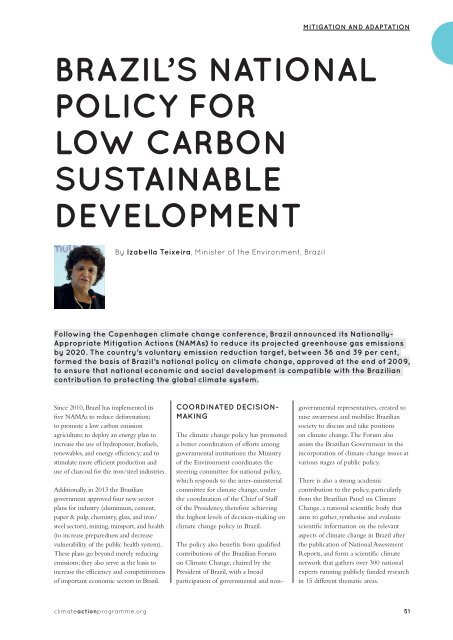Climate Action 2014-2015
You also want an ePaper? Increase the reach of your titles
YUMPU automatically turns print PDFs into web optimized ePapers that Google loves.
MITIGATION AND ADAPTATION<br />
BRAZIL’S NATIONAL<br />
POLICY FOR<br />
LOW CARBON<br />
SUSTAINABLE<br />
DEVELOPMENT<br />
By Izabella Teixeira, Minister of the Environment, Brazil<br />
Following the Copenhagen climate change conference, Brazil announced its Nationally-<br />
Appropriate Mitigation <strong>Action</strong>s (NAMAs) to reduce its projected greenhouse gas emissions<br />
by 2020. The country’s voluntary emission reduction target, between 36 and 39 per cent,<br />
formed the basis of Brazil’s national policy on climate change, approved at the end of 2009,<br />
to ensure that national economic and social development is compatible with the Brazilian<br />
contribution to protecting the global climate system.<br />
Since 2010, Brazil has implemented its<br />
five NAMAs to reduce deforestation;<br />
to promote a low carbon emission<br />
agriculture; to deploy an energy plan to<br />
increase the use of hydropower, biofuels,<br />
renewables, and energy efficiency; and to<br />
stimulate more efficient production and<br />
use of charcoal for the iron/steel industries.<br />
Additionally, in 2013 the Brazilian<br />
government approved four new sector<br />
plans for industry (aluminium, cement,<br />
paper & pulp, chemistry, glass, and iron/<br />
steel sectors), mining, transport, and health<br />
(to increase preparedness and decrease<br />
vulnerability of the public health system).<br />
These plans go beyond merely reducing<br />
emissions; they also serve as the basis to<br />
increase the efficiency and competitiveness<br />
of important economic sectors in Brazil.<br />
COORDINATED DECISION-<br />
MAKING<br />
The climate change policy has promoted<br />
a better coordination of efforts among<br />
governmental institutions: the Ministry<br />
of the Environment coordinates the<br />
steering committee for national policy,<br />
which responds to the inter-ministerial<br />
committee for climate change, under<br />
the coordination of the Chief of Staff<br />
of the Presidency, therefore achieving<br />
the highest levels of decision-making on<br />
climate change policy in Brazil.<br />
The policy also benefits from qualified<br />
contributions of the Brazilian Forum<br />
on <strong>Climate</strong> Change, chaired by the<br />
President of Brazil, with a broad<br />
participation of governmental and nongovernmental<br />
representatives, created to<br />
raise awareness and mobilise Brazilian<br />
society to discuss and take positions<br />
on climate change. The Forum also<br />
assists the Brazilian Government in the<br />
incorporation of climate change issues at<br />
various stages of public policy.<br />
There is also a strong academic<br />
contribution to the policy, particularly<br />
from the Brazilian Panel on <strong>Climate</strong><br />
Change, a national scientific body that<br />
aims to gather, synthesise and evaluate<br />
scientific information on the relevant<br />
aspects of climate change in Brazil after<br />
the publication of National Assessment<br />
Reports, and form a scientific climate<br />
network that gathers over 300 national<br />
experts running publicly funded research<br />
in 15 different thematic areas.<br />
climateactionprogramme.org 51












